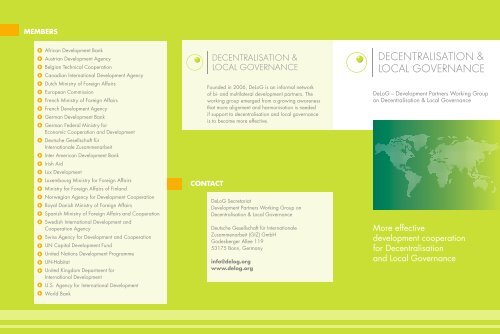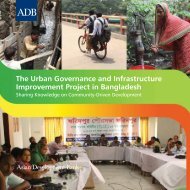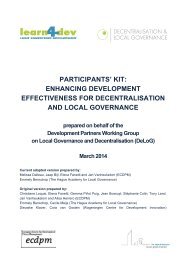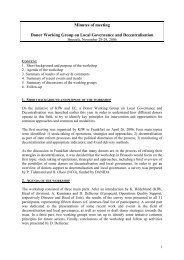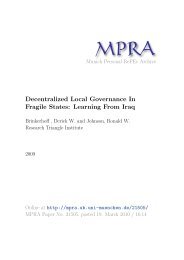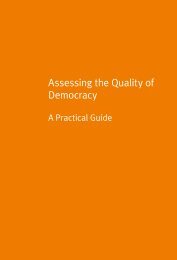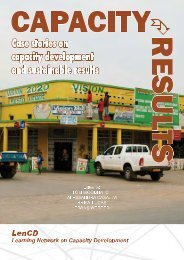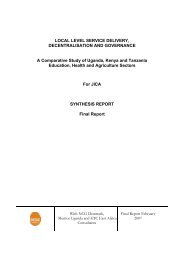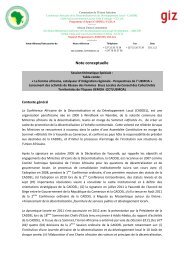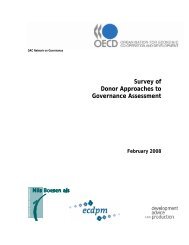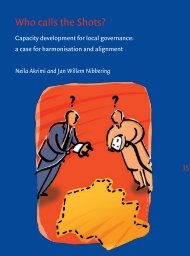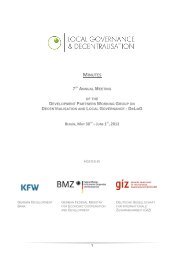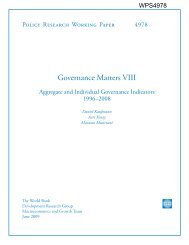DP Working Group Flyer 2012 (PDF 369 KB - DeLoG
DP Working Group Flyer 2012 (PDF 369 KB - DeLoG
DP Working Group Flyer 2012 (PDF 369 KB - DeLoG
Create successful ePaper yourself
Turn your PDF publications into a flip-book with our unique Google optimized e-Paper software.
MEMBERS<br />
African Development Bank<br />
Austrian Development Agency<br />
Belgian Technical Cooperation<br />
Canadian International Development Agency<br />
Dutch Ministry of Foreign Affairs<br />
European Commission<br />
French Ministry of Foreign Affairs<br />
French Development Agency<br />
German Development Bank<br />
German Federal Ministry for<br />
Economic Cooperation and Development<br />
Deutsche Gesellschaft für<br />
Internationale Zusammenarbeit<br />
Inter American Development Bank<br />
Irish Aid<br />
Lux Development<br />
Luxembourg Ministry for Foreign Affairs<br />
Ministry for Foreign Affairs of Finland<br />
Norwegian Agency for Development Cooperation<br />
Royal Danish Ministry of Foreign Affairs<br />
Spanish Ministry of Foreign Affairs and Cooperation<br />
Swedish International Development and<br />
Cooperation Agency<br />
Swiss Agency for Development and Cooperation<br />
UN Capital Development Fund<br />
United Nations Development Programme<br />
UN-Habitat<br />
United Kingdom Department for<br />
International Development<br />
U.S. Agency for International Development<br />
World Bank<br />
Founded in 2006, <strong>DeLoG</strong> is an informal network<br />
of bi- and multilateral development partners. The<br />
working group emerged from a growing awareness<br />
that more alignment and harmonisation is needed<br />
if support to decentralisation and local governance<br />
is to become more effective.<br />
CONTACT<br />
<strong>DeLoG</strong> Secretariat<br />
Development Partners <strong>Working</strong> <strong>Group</strong> on<br />
Decentralisation & Local Governance<br />
Deutsche Gesellschaft für Internationale<br />
Zusammenarbeit (GIZ) GmbH<br />
Godesberger Allee 119<br />
53175 Bonn, Germany<br />
info@delog.org<br />
www.delog.org<br />
<strong>DeLoG</strong> – Development Partners <strong>Working</strong> <strong>Group</strong><br />
on Decentralisation & Local Governance<br />
More effective<br />
development cooperation<br />
for Decentralisation<br />
and Local Governance
WHY DECENTRALISATION AND LOCAL<br />
GOVERNANCE MATTER FOR DEVELOPMENT EFFECTIVE SUPPORT TO DLG WHAT WE DO<br />
While development partners are working towards<br />
achieving the Millennium Development Goals (MDGs),<br />
new challenges have emerged which threaten the<br />
development opportunities of the poor. Among the<br />
most critical threats are the global fi nancial crisis,<br />
urbanisation, climate change and food security.<br />
According to the Rio+20 outcome document and<br />
the Busan Global Partnership, achieving sustainable<br />
solutions to these challenges requires the involvement<br />
of subnational governments and other relevant local<br />
actors.<br />
Both documents emphasise the role of local governments<br />
in enhancing democratic ownership, accountability<br />
and participation.<br />
Decentralised governments play a crucial role in enabling<br />
local development, assuring equal and<br />
adequate service delivery and thereby improving<br />
livelihoods. Due to their proximity to citizens and<br />
communities, local actors are more likely to have<br />
a better understanding of local needs than central<br />
authorities.<br />
Further, local governments are able to adjust national<br />
and regional development strategies to the realities<br />
of their territory, leading to more effective resource<br />
allocation and improved development results.<br />
The subnational level – including local parliaments,<br />
civil society organisations, media and community<br />
groups – plays a major role in establishing and<br />
nurturing accountability towards citizens and aid<br />
benefi ciaries. Local governments are the logical<br />
actors to bridge the imperatives of upward and<br />
downward accountability.<br />
Decentralisation and local governance (DLG) reforms<br />
are highly political processes. They involve different<br />
government levels and a multitude of actors with different<br />
interests and incentives. Development partner need<br />
to take these political economy dynamics into account<br />
when providing support for DLG.<br />
In order to fully unlock the potential of DLG to achieve<br />
sustainable development results, reforms need to establish<br />
an appropriate legal and institutional framework<br />
and must be embedded coherently in a wider public<br />
sector reform process.<br />
Reforms also need to provide lower tiers of government<br />
with adequate fi nancial resources, ideally through<br />
intergovernmental transfers and access to meaningful<br />
local sources of revenue.<br />
What can development partners do to support the<br />
sustainable development of local governments and<br />
other actors at subnational level?<br />
l Develop the necessary capacities of local<br />
governments to effectively fulfi l their assigned<br />
functions;<br />
l Strengthen sound and transparent public<br />
fi nancial management systems;<br />
l Build effective oversight and performance<br />
assessment systems;<br />
l Secure transparency, accountability and citizen<br />
participation in local development planning;<br />
l Create an enabling environment for local<br />
economic development.<br />
<strong>DeLoG</strong> aims to improve the development effectiveness<br />
of development partners in the fi eld of DLG through<br />
more harmonised and coordinated interventions.<br />
Our main activities are to<br />
l Act as a platform for DLG practitioners to share<br />
and disseminate knowledge through a website<br />
and newsletters;<br />
l Conduct studies on issues of crucial importance<br />
for the improvement of development effectiveness<br />
in the area of DLG;<br />
l Generate evidence-based advocacy for DLG<br />
in the international development debate;<br />
l Contribute to the design of joint development<br />
partner support strategies;<br />
l Conduct and facilitate joint training for<br />
more effective support to DLG.


